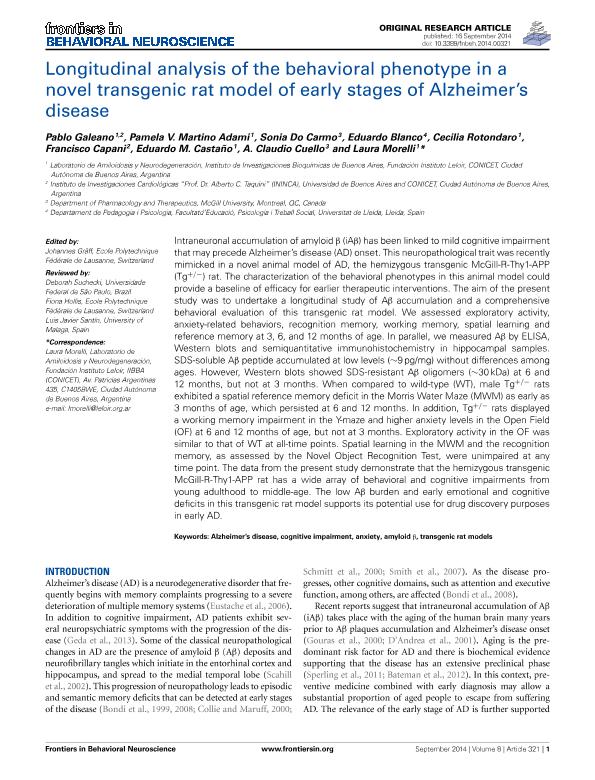Artículo
Longitudinal analysis of the behavioral phenotype in a novel transgenic rat model of early stages of Alzheimer's disease
Galeano, Pablo ; Martino Adami, Pamela Victoria
; Martino Adami, Pamela Victoria ; Do Carmo, Sonia; Blanco, Eduardo; Rotondaro, Cecilia
; Do Carmo, Sonia; Blanco, Eduardo; Rotondaro, Cecilia ; Capani, Francisco
; Capani, Francisco ; Castaño, Eduardo Miguel
; Castaño, Eduardo Miguel ; Cuello, A. Claudio; Morelli, Laura
; Cuello, A. Claudio; Morelli, Laura
 ; Martino Adami, Pamela Victoria
; Martino Adami, Pamela Victoria ; Do Carmo, Sonia; Blanco, Eduardo; Rotondaro, Cecilia
; Do Carmo, Sonia; Blanco, Eduardo; Rotondaro, Cecilia ; Capani, Francisco
; Capani, Francisco ; Castaño, Eduardo Miguel
; Castaño, Eduardo Miguel ; Cuello, A. Claudio; Morelli, Laura
; Cuello, A. Claudio; Morelli, Laura
Fecha de publicación:
09/2014
Editorial:
Frontiers
Revista:
Frontiers in Behavioral Neuroscience
ISSN:
1662-5153
Idioma:
Inglés
Tipo de recurso:
Artículo publicado
Clasificación temática:
Resumen
Intraneuronal accumulation of amyloid beta (iAbeta) has been linked to mild cognitive impairment that may precede Alzheimers disease (AD) onset. This neuropathological trait was recently mimicked in a novel animal model of AD, the hemizygous transgenic McGill-R-Thy1-APP (Tg+/-) rat. The characterization of the behavioral phenotypes in this animal model could provide a baseline of efficacy for earlier therapeutic interventions. The aim of the present study was to undertake a longitudinal study of Abeta accumulation and a comprehensive behavioral evaluation of this transgenic rat model. We assessed exploratory activity, anxiety-related behaviors, recognition memory, working memory, spatial learning and reference memory at 3, 6 and 12 months of age. In parallel, we measured Abeta by ELISA, Western blots and semiquantitative immunohistochemistry in hippocampal samples. SDS-soluble Abeta peptide accumulated at low levels (9 pg/mg) without differences among ages. However, Western blots showed SDS-resistant Abeta oligomers (30 kDa) at 6 and 12 months, but not at 3 months. When compared to wild-type (WT), male Tg+/- rats exhibited a spatial reference memory deficit in the Morris Water Maze (MWM) as early as 3 months of age, which persisted at 6 and 12 months. In addition, Tg+/- rats displayed a working memory impairment in the Y-maze and higher anxiety levels in the Open Field (OF) at 6 and 12 months of age, but not at 3 months. Exploratory activity in the OF was similar to that of WT at all time points. Spatial learning in the MWM and the recognition memory, as assessed by the Novel Object Recognition Test, were unimpaired at any time point. The data from the present study demonstrate that the hemizygous transgenic McGill-R-Thy1-APP rat has a wide array of behavioral and cognitive impairments from young adulthood to middle-age. The low Abeta burden and early emotional and cognitive deficits in this transgenic rat model supports its potential use for drug discovery purposes in early AD.
Archivos asociados
Licencia
Identificadores
Colecciones
Articulos(IIBBA)
Articulos de INST.DE INVEST.BIOQUIMICAS DE BS.AS(I)
Articulos de INST.DE INVEST.BIOQUIMICAS DE BS.AS(I)
Articulos(ININCA)
Articulos de INST.DE INVEST.CARDIOLOGICAS (I)
Articulos de INST.DE INVEST.CARDIOLOGICAS (I)
Citación
Galeano, Pablo; Martino Adami, Pamela Victoria; Do Carmo, Sonia; Blanco, Eduardo; Rotondaro, Cecilia; et al.; Longitudinal analysis of the behavioral phenotype in a novel transgenic rat model of early stages of Alzheimer's disease; Frontiers; Frontiers in Behavioral Neuroscience; 8; 321; 9-2014; 1-15
Compartir
Altmétricas



